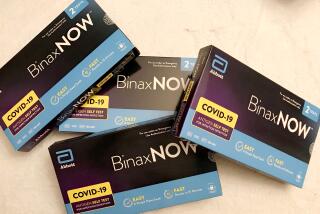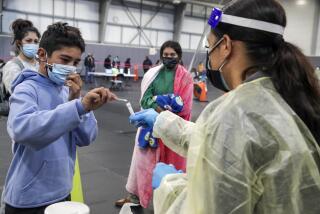Groups Urge Broader Colon Cancer Testing
WASHINGTON — Not enough elderly Americans are being screened for colon cancer, even though Medicare often picks up most of the costs, according to critics asking Congress to expand coverage.
The American Cancer Society estimates that colon cancer will kill 48,000 people this year in the United States, more than any other cancer except lung cancer.
Congress passed legislation in 1997 that provided Medicare coverage of colonoscopies for screening purposes, but a General Accounting Office review of claims in 1999 found just 3.8% of Medicare patients had gotten a colonoscopy that year. That’s just 1 percentage point above 1995, before Medicare began covering screenings.
“Virtually every Medicare recipient should be screened for colorectal cancer,” Randy Fenninger, a spokesman for the American Society for Gastrointestinal Endoscopy, said Monday. “The promise of the legislation isn’t being fulfilled.”
ASGE, the American College of Gastroenterology and other health groups say the Medicare coverage rules discourage testing. For example, the critics say, patients must exceed their deductible before Medicare will pick up any of the costs. In addition, the program doesn’t cover the cost of the doctor’s visit before the procedure.
Under current law, a Medicare patient who undergoes a screening colonoscopy as a hospital outpatient pays 20% of the roughly $205 doctor’s fee, and, if the patient has reached his yearly deductible, Medicare pays 80%.
Legislation introduced in both the House and Senate would pick up 80% of the cost whether or not a patient has reached the deductible and would cover the patient’s visit to the doctor before the procedure. It also would raise to about $265 the maximum physicians could charge for the test to qualify for Medicare reimbursement.
“We think that the result will be more access to early detection and treatment, and therefore we believe thousands of lives [will be] saved,” said Sen. Joseph I. Lieberman (D-Conn.), a sponsor of the bill.
More to Read
Sign up for Essential California
The most important California stories and recommendations in your inbox every morning.
You may occasionally receive promotional content from the Los Angeles Times.










